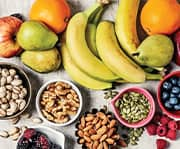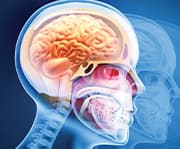Life Extension Magazine®
Results from an analysis of a clinical trial revealed a benefit for the use of coenzyme Q10 with standard treatment during early recovery from heart attack in comparison with standard treatment alone.
Investigation of CoQ10's mechanisms of action suggested a healthier inflammatory response among people who consume CoQ10.*
The trial included 120 heart attack patients who underwent stent placement and were treated with antiplatelet therapy and statin drugs. (Statins decrease CoQ10 synthesis.) Sixty-one participants received 30 mg CoQ10 per day. (A low dose compared to what most supplement users take today.)
At one- and three-month follow-up examinations, trial participants who were given CoQ10 had greater increases in ejection fraction (which is reduced in heart failure) than the control group. At three months, B-type natriuretic peptide (which, when elevated, can indicate heart failure) had declined to a greater extent among those who received CoQ10. These improvements suggest that CoQ10 supported early heart-function recovery.
Editor's Note: Investigation of CoQ10's mechanisms of action in a concurrent mouse study suggested that there was less inflammation in the hearts of mice receiving CoQ10 than in those who did not get it.
* BMC Cardiovasc Disord. 2024 Jan 28;24(1):76.
Green Tea Intake Lowers Risk of Cardiovascular Disease in Diabetics
Overweight/obese diabetics with a high intake of green tea had a lower risk of developing cardiovascular disease, coronary heart disease, and stroke than those who did not consume it.*
Researchers evaluated data from 4,756 overweight or obese diabetic participants in the Comprehensive Research on the Prevention and Control of the Diabetes program, an ongoing epidemiologic study in China. They were followed up for a little more than six years.
Compared with participants who did not consume green tea, those who used five grams or more of green tea leaves per day had a 29% lower risk of cardiovascular disease, a 40% lower risk of coronary heart disease and a 30% reduction in the risk of stroke.
Editor's Note:"Green tea possesses a great amount of antioxidant components including free amino acids, caffeine and polyphenols," the authors stated.
* Arch Public Health. 2024 Feb 2;82:18.
Antioxidant Consumption Linked to Less Visceral Fat
A study published in Nutrition Research found a link between increased consumption of antioxidants and decreased visceral adipose tissue.* Visceral fat surrounds the organs within the abdomen.
The study included 10,389 participants in the National Health and Nutrition Examination Survey (NHANES) 2011–2018.
Visceral adipose tissue areas were measured with DXA scans. Responses to dietary recall interviews provided information concerning antioxidant nutrient intake. The Composite Dietary Antioxidant Index was calculated from intake levels of vitamins A, C and E, carotenoids, selenium and zinc.
Higher Composite Dietary Antioxidant Index values were associated with lower visceral adipose tissue areas. Compared with individuals whose values were among the lowest one-third of subjects, those whose values were among the top third had significantly less visceral fat.
Editor's Note:An unhealthy amount of visceral fat is associated with an increased risk factor for diabetes, cardiovascular disease, metabolic-associated fatty liver disease, and some types of cancer, the authors noted.
* Nutr Res. 2024 Jan 26;124:13-20.
Branched Chain Amino Acids Boost Concussion Recovery
A pilot, double-blind, randomized controlled clinical study revealed a benefit for branched chain amino acids in the treatment of concussion.* Branched chain amino acids are among the building blocks of the body's proteins.
The trial included 38 concussion patients aged 11–34. Participants received 15, 30, 45 or 54 grams of branched chain amino acids or a placebo daily for 21 days. Daily neurocognitive tests were conducted, and symptoms, physical and cognitive activity and other factors were evaluated.
At the trial's conclusion, participants who were given branched chain amino acids had decreases in total symptom score in dose dependent manner. Return to physical activity also improved in association with the amount of branched chain amino acids received.
Editor's Note: There was a "significant reduction in total symptom score" (decrease of 4.4 points on a 0-54 scale for every 500 grams of study drug consumed)," researchers concluded, and an increase in "return to physical activity (increase of 0.5 points on a 0-5 scale for every 500 grams of study drug consumed)."
* J Neurotrauma. 2024 April 11.




